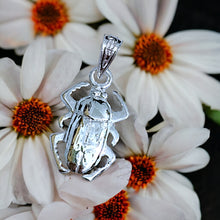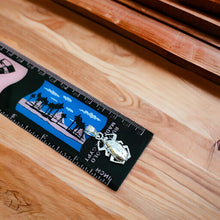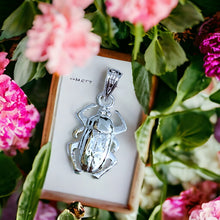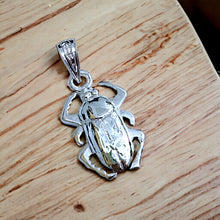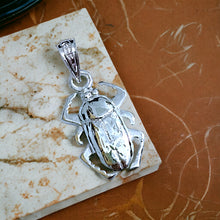Silver Scarab Pendant Necklace
- Regular price
- $75.00 USD
- Sale price
- $75.00 USD
- Regular price
-
- Unit price
- /per
Sale
Sold out
Shipping calculated at checkout.
Adding product to your cart
The Silver Scarab Pendant Necklace: Inspired by ancient Egyptian beliefs, this exquisite piece pays homage to the sacred scarab beetle, symbolizing rebirth and protection. Crafted with meticulous detail, it merges history with modern elegance, offering a timeless adornment for those who seek both beauty and meaning.
- History: Inspired by ancient Egyptian culture, symbolizing rebirth and protection.
- Spiritually: Represents transformation, renewal, and guidance in life's journey.
- Talisman: Believed to bring luck, ward off negativity, and offer spiritual protection.
- Handmade: Crafted with care and attention to detail, ensuring uniqueness in each piece.
- Healing: Thought to promote emotional healing and inner strength.
- Material: Made of sterling silver, known for its purity and durability.
- Symbolism: Scarab beetle symbolizes resurrection, eternity, and the cycle of life.
- How to Wear: Slide onto any chain up to 5mm thickness for versatile styling.
History Side For Those Who Are Interested
The Egyptian Royal Scarab Amulet holds a significant place in the annals of ancient Egyptian history, revered for its multifaceted symbolism and esteemed status within the cultural and religious milieu of the Nile Valley civilization. The scarab beetle, a creature endemic to the region, played a pivotal role in ancient Egyptian beliefs, representing various aspects of life, death, and rebirth. As such, the scarab amulet emerged as a potent emblem of protection, regeneration, and divine favor.
The origins of the Egyptian Royal Scarab Amulet can be traced back to the predynastic period (circa 5500–3100 BCE), where early iterations of the scarab beetle motif began to manifest in the form of pottery decorations and seals. However, it was during the Old Kingdom (circa 2686–2181 BCE) that the scarab amulet attained widespread popularity, becoming a ubiquitous symbol in Egyptian art, religious practices, and funerary rites.
The scarab beetle's association with the sun god Ra, who was believed to navigate the celestial realms in a solar boat, imbued the amulet with solar symbolism and cosmic significance. In Egyptian mythology, the scarab was also linked to Khepri, a deity depicted as a scarab beetle or as a man with a scarab for a head, symbolizing the concept of transformation and renewal.
During the Middle Kingdom (circa 2055–1650 BCE), the Egyptian Royal Scarab Amulet reached its zenith in terms of craftsmanship and religious veneration. Amulets were meticulously carved from various materials such as precious metals, gemstones, faience, and glazed steatite, with intricate hieroglyphic inscriptions adorning their undersides. These inscriptions often invoked protective spells and blessings, ensuring the wearer's wellbeing in both this life and the afterlife.
The New Kingdom (circa 1550–1070 BCE) witnessed the scarab amulet's continued prominence, particularly in the context of royal patronage and dynastic legitimacy. Pharaohs and nobles adorned themselves with elaborately crafted scarab jewelry, believing it to confer divine favor and authority bestowed by the gods.
In addition to its personal adornment, the Egyptian Royal Scarab Amulet played a pivotal role in funerary practices, where it was often placed upon the deceased during mummification rituals as a safeguard against malevolent forces and as a symbol of resurrection and eternal life.
The enduring legacy of the Egyptian Royal Scarab Amulet persisted well into the Greco-Roman period (circa 332 BCE – 395 CE), where it continued to be produced and utilized within the context of syncretic religious practices blending indigenous Egyptian beliefs with Hellenistic and Roman influences.
Today, examples of these ancient artifacts can be found in museums and private collections worldwide, serving as tangible links to the rich cultural heritage of ancient Egypt and the enduring legacy of the royal scarab amulet.
Use left/right arrows to navigate the slideshow or swipe left/right if using a mobile device






